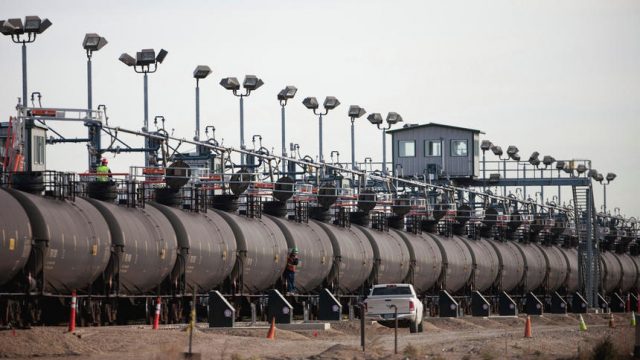Democratic Presidential Candidate Signs Bill Implementing a “De Facto Ban” on North Dakota Oil Shipments

Oil tanker cars are lined up at a crude oil rail loading terminal in Tioga. photo by Eric Hylden/Grand Forks Herald
Washington Governor Jay Inslee just signed legislation in his state imposing regulations on oil shipped by rail which are so stringent they act (to use the words of North Dakota’s congressional delegation) as a “de facto ban.”
Inslee has justified the move by saying the state is stepping up to fill a safety vacuum left by the federal government. “As the federal government continues to fail to exercise its full powers to ensure the safe transport of oil by rail, Washington needs to remain vigilant in protecting our communities from the very real risk of derailments,” Inslee said Thursday.
This is important for North Dakota, because a not insignificant portion of the oil produced in our state gets shipped by rail to refineries in Washington.
Of course, Inslee is also one of many candidates for the Democratic presidential nomination, so it’s probably safe to say this is more about politics than sound policy. The legislation sets a completely arbitrary vapor pressure standard that was picked not based on science but on a political desire to inhibit oil shipments.
The national standard for vapor pressure for oil-by-rail shipments is 14.7 psi.
North Dakota’s standard is 13.7.
Washington is now setting that limit all the way down to 9 psi.
The goal here isn’t the safe transport of oil. The goal is no transport at all. And Inslee, who wants to president, can’t be seen eschewing his party’s opposition to oil and gas development in favor of pragmatic policy making. Thus, his signature.
Problem is, beyond the unworkable nature of the policy itself, is that what they’re doing is almost certainly illegal. Congress, and not the states, regulates interstate commerce, and North Dakota has a strong and quite recent track record of successfully defeating onerous state-level regulation of its exports.
Not so long ago Minnesota attempted to impose a policy that would have blocked the import of coal-fired electricity into their state (though, hypocritically, the policy said nothing about Minnesota’s own coal-fired electricity). North Dakota sued, and not only was the law struck down by the courts, but just last year North Dakota was awarded $1.3 million worth of legal fees to be paid by Minnesota.
Minnesota tried to regulate interstate commerce and they paid a heavy price for it.
I suspect a similar outcome is in Washington’s future.
We can have a debate about the federal government’s regulation of oil-by-rail shipments, but Washington’s politically-driven attempt to essentially block oil by rail shipments is the wrong way to address the issue.




